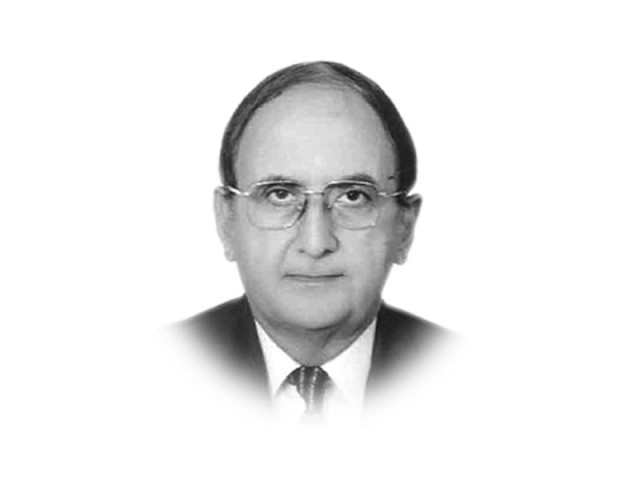Internal wars of political parties
The major political parties should make self-corrections in their organisational structures and political agendas

The writer is an independent political and defence analyst. He is also the author of several books, monographs and articles on Pakistan and South Asian affairs
Cabinet rifts
Pakistan’s political parties have invariably been fiefdoms of the top leaders who run them like oligarchic political machines. Most parties are identified by their leader and, if you exclude that leader, the party becomes a ship without a rudder. In fact, in some cases, the name of the leader is part of the party’s name.
In Pakistan, political parties are required by law to hold internal elections. Such elections are merely a formality to fulfil legal requirements. However, whenever a party attempts to hold open and competitive elections, it runs into serious organisational problems. The PTI held open and competitive elections in 2013-14, which caused factional conflicts, charges and counter-charges of manipulation of the elections through the use of money and other means. The major reason for this is that in the absence of a democratic culture, most competing groups in a political party are not willing to accept results that go against them. Thus, open and competitive elections within parties that lack a democratic culture prove to be disruptive. While the PTI has faced internal problems after its internal elections, it continues to demonstrate organisational skills by holding big public meetings and its election campaign in the Lahore NA-122 by-election was well-managed.
ECP rejects PTI's allegations on voters list, transfer of votes from NA-122
The ruling PML-N is in the grip of internal conflict caused by strong ego drives of some of its leaders. Four cabinet members have talked against one another and the forthcoming local government elections are exposing internal cracks within the party. Events in Faisalabad and Bahawalnagar highlight these cracks.
Three major factors explain the PML-N’s internal fights. First, Nawaz Sharif runs the party and the government in a highly personalised manner with the help of his favourite political leaders and bureaucrats. The governance methodology of Shahbaz Sharif is also highly personalised as he relies exclusively on his favourite bureaucrats. Formal state institutional arrangements hardly matter to these two leaders who have created their personalised networks, if not empires. Several senior party leaders and federal ministers have also created their own little empires comprising select bureaucrats and political loyalists. They have also developed strong egos. Consequently, every issue is judged on the basis of personalised considerations, resulting in direct and indirect conflict among ministers.
Second, the non-transparency in electricity generation projects, especially the Nandipur issue, import of LNG, the petrol crisis earlier this year, and the growing pressure from the opposition and media on these issues, have caused intra-government tension and conflict, with each ministry defending itself and blaming other departments for its failure or poor performance. The ministers relevant to these issues refuse to accept that there has been any mismanagement in these sectors. The position of Defence Minister Khawaja Asif has become redundant because the prime minister office and the army headquarters interact directly. The defence minister’s anti-military reputation also adversely affects his capacity to interact with the military.
Read: NA-122 result: PTI calls for ballot recount, verification of voters list
Third, the increased reliance of the federal government on the military for internal and external security and foreign policy has created a crisis of confidence within the PML-N. This approach may have saved the Sharif government against pressures from the opposition in 2014-15, but it has gone against Nawaz Sharif’s habit of personalised governance. The uncertainties of the civil-military relationship are coupled with sharp criticism from the opposition and a section of the media on bad governance, corruption and kickbacks in high-profile projects. All this is viewed by Nawaz Sharif’s close associates as a conspiracy to remove him from power. Consequently, the prime minister has to adopt a soft approach towards internal party conflicts so that the alleged conspiracy against him does not gather strength. This makes it easy for cabinet members to engage in personal feuding.
The feuding ministers are not expected to resign because they do not have autonomous standing in the public’s eye. If any one of them resigns, he will be pushed into the wilderness. None will be welcomed in any opposition party; nor do they see this as their future. All of them will stay on in the party and continue with their personal and ego-based fights.
The PPP faces its gravest ever internal crisis, which can make it totally irrelevant in electoral politics if it does not address the three inter-related crises of leadership, organisation and ideology. It will have to sideline Asif Ali Zardari and his sister, and bring about leadership changes in Punjab and Sindh. The party cannot be reorganised in Punjab without off-loading some of its top leaders. Furthermore, it needs to consider reclaiming its identity as the voice of the poor.
Read: Thin margin victory: PML-N reclaims NA-122
The by-election in NA-122 exposed, once again, the divisions and splits among the religious parties. Some stood by the PML-N while others supported Imran Khan. Interestingly enough, the religious parties that shared a denominational identity with the Taliban and sympathy for militancy supported the PML-N.
These weaknesses in the party system cannot be removed by passing new laws to regulate them. The major political parties should make self-corrections in their organisational structures and political agendas, and control their feuding leaders. This will improve internal harmony of the parties and strengthen their role, which will reinforce democracy in Pakistan.
Published in The Express Tribune, October 19th, 2015.
Like Opinion & Editorial on Facebook, follow @ETOpEd on Twitter to receive all updates on all our daily pieces.














COMMENTS
Comments are moderated and generally will be posted if they are on-topic and not abusive.
For more information, please see our Comments FAQ